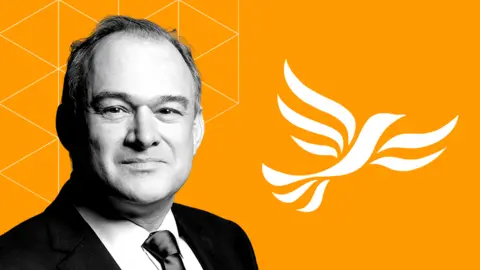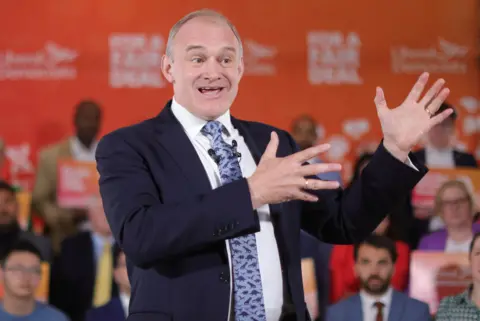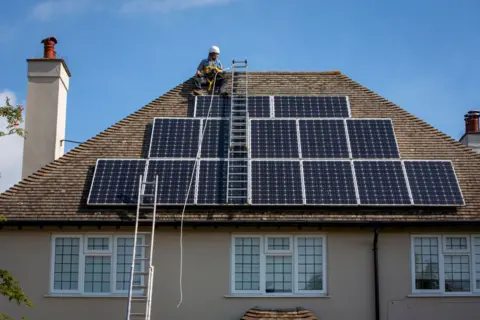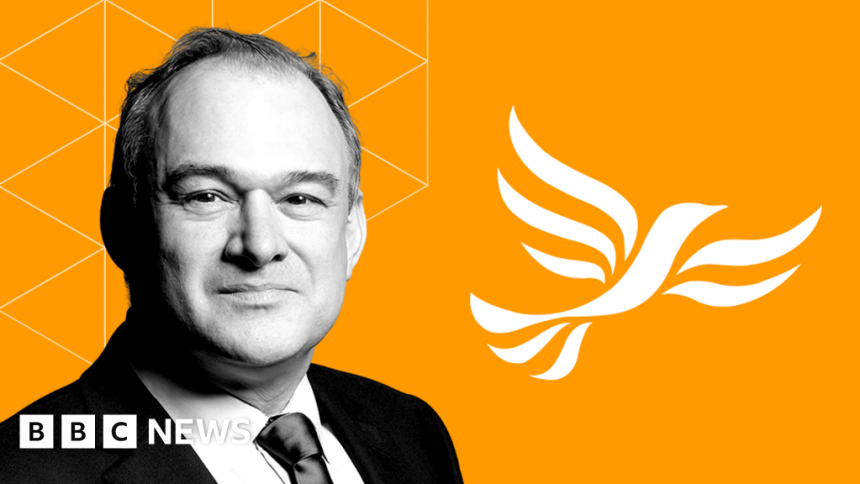Liberal Democrat manifesto: 11 key policies analysed
 Getty Images
Getty ImagesThe Liberal Democrats have launched their 2024 election manifesto, called For A Fair Deal. The document sets out the policies that the party plans to introduce should it win the election.
Here are 11 of the most eye-catching promises.
Free personal care in England
The Liberal Democrats plan to introduce free personal care in England, similar to the system that operates in Scotland where people needing help with daily tasks do not have to pay. It is currently means-tested in England, with only the poorest receiving help.
The policy sounds attractive, but Scotland has shown, it is not a silver bullet. Much depends on who is eligible for free personal care. While anyone is entitled to ask for an assessment, that does not mean they will get support. Only those with significant needs qualify – and there are signs in Scotland this has had to be more tightly rationed since it was introduced more than 20 years ago.
That results in some people still deciding they have to pay for their own personal care in some circumstances.
Social care is devolved so these policies would apply to England only.
More GPs and faster cancer treatment
The Liberal Democrats have promised 8,000 more GPs in England – but the detail here is important. Will these be fully trained GPs, or doctors working in surgeries? The latter are qualified doctors but still in training to do general practice – their number is already increasing, and that has been highlighted by the Conservatives.
The number of fully trained GPs in England has fallen in recent years and it takes up to 10 years from the start of medical school to fully qualify for general practice.
A key cancer target is for most patients to begin treatment within 62 days of an urgent referral – specifically 85% within that time. But that has been repeatedly missed in England. The Lib Dems say they want to give all urgently referred patients the 62-day guarantee. Given the scale of the backlog, this will be a huge challenge and it’s not clear what timeframe the party have set to make good on their pledge.
Health is devolved so these policies would apply to England only.
 NEIL HALL/EPA-EFE/REX/Shutterstock
NEIL HALL/EPA-EFE/REX/ShutterstockIncrease public spending
The Liberal Democrats say they would spend almost £27bn more a year by 2029. They say they would raise levies on banks, which would net an extra £4bn. They also hope to raise more than £5bn from reforming capital gains tax, but revenue there depends on the behaviour of a few tens of thousands of the most wealthy. A new aviation duty would penalise frequent fliers more heavily, but details aren’t finalised.
They think they could raise £7bn through cracking down on tax avoidance through investing £1bn in HMRC. They also say they’ll keep the freeze on the thresholds at which different rates of taxes on income apply. Current plans have those frozen until 2028. These plans still potentially leave the tax burden, as most manifestos may do, on track for a post-World War Two high.
This would apply to the whole of the UK.
Scrap the Rwanda scheme
The tone of the Lib Dem manifesto on immigration is more sympathetic and positive than much of the debate on the topic during the campaign. It refers to the UK’s “proud history of welcoming newcomers” and proposes a system that “treats everyone with respect”. There is no mention of reducing immigration numbers, in what is an appeal to the significant proportion of the population who believe migrants benefit the country.
The party would abolish the current salary threshold for migrant workers in favour of what it calls a “merit-based” system. They would also end the recently introduced ban on foreign care workers bringing dependents to the UK and reverse the increase in income thresholds for family visas. The party says it would scrap the Rwanda scheme, and “provide safe and legal routes” for asylum seekers.
This would apply to the whole of the UK.
Reach net zero by 2045
Ed Davey made no mention of climate change in his summary of his party’s ambitions. The Liberal Democrats had promised “to place tackling the climate crisis at the centre of all our policies.” In the 2024 manifesto, that has become a promise to “put tackling climate change at the heart of a new industrial strategy”.
In fact, climate change comes third in the list of priorities in the manifesto, after the economy and business and jobs.
 Getty Images
Getty ImagesThe Lib Dems have retained their ambitious net zero target, 2045 rather than the 2050 target the Conservatives and Labour say they’ll work towards.
They say they will accelerate the deployment of solar and wind power so 90% of power will be generated by renewables by 2030 if they are in charge.
Among other policies, the party says there’ll be free insulation and heat pumps for those on low incomes, a “rooftop solar revolution” with more incentives for householders to put in solar panels and a new Net Zero Delivery Authority to coordinate climate action – but there are no estimates of costs for these policies.
This would apply to the whole of the UK.
Scrap two-child limit and reform Carer’s Allowance
The Lib Dems would scrap or reform a range of welfare policies that anti-poverty campaigners have repeatedly said are increasing family hardship, going further than either the Conservatives or Labour have done so far.
They plan to remove the two-child limit and benefit cap for Child Benefit payments, and reduce the waiting time for the first Universal Credit payment from five weeks to five days.
Over the longer term, they say they’ll review annual benefit levels, a step towards what groups like the Joseph Rowntree Foundation and the Trussell Trust call an “essentials guarantee”. That aims to ensure that benefit levels are high enough for people to be able to afford basic items, such as food and bills.
There are plans to reform Carer’s Allowance and immediately increase the benefit by £20 a week, expand its eligibility and increase how much people can earn before losing the benefit. There has been criticism recently of the government prosecuting people who’ve inadvertently claimed Carer’s Allowance despite not being eligible; the Lib Dems would introduce an amnesty for many of those cases.
Universal Credit and Carer’s Allowance both apply across the UK.
Triple the early years pupil premium
Giving a better chance to disadvantaged pupils and students in England is the core theme of Lib Dem promises on education. In schools, this includes a tutoring guarantee for children from low-income families who need extra help, and tripling the early years pupil premium – to £1,000 – to front-load support.
There is a bold, and potentially expensive, promise to increase school and college funding for each pupil above inflation every year, following 14 years in which it has stagnated in real terms. A young person’s premium would target disadvantaged 16- to 18-year-olds.
Universities will welcome a review of their funding, although it pushes the issue down the road. Tuition fees in England became toxic for the party after it broke a promise and voted through increased fees of £9,000. For students from low income families there is a promise to bring back maintenance grants, which were scrapped in favour of loans in 2016. This will be welcomed as the loans have not kept up with rising prices, but it is also extra public spending.
Education is devolved so these policies would only apply in England
Speed up the courts process
There are plans to create a more efficient and supportive justice system, although the challenge is significant. The Lib Dems would increase funding, set targets and introduce reforms to ensure the courts are properly staffed and deal with cases more quickly. The party promises to halve the time it take to sentence all criminals from when the offence is committed – a highly ambitious aim.
There is a particular emphasis on supporting survivors of domestic abuse and those in mental ill-health. Towards the end of their manifesto section on crime, there is a specific pledge to crack down on kitten and puppy smuggling and a promise to end prison overcrowding – a major challenge for criminal justice, but without details of how it might be achieved or paid for.
The justice system is devolved in Scotland and Northern Ireland, so this would apply to England and Wales.
Recognise non-binary identities and ban conversion therapy
Non-binary identities would be recognised in law under the Lib Dems. Data from the last UK census shows around 30,000 people identify as non-binary – there have been unsuccessful legal attempts to have them legally recognised before.
The party also wants to reform the gender recognition process. Currently anyone wanting to change their legally recognised sex has to provide two medical reports, one from a specialist detailing their diagnosis and another listing any treatment or surgery they may have had to change their sexual characteristics. The Lib Dems want to remove the need for medical reports. Labour and the Conservatives have previously pledged to simplify this process.
A complete ban on so-called conversion therapy is also promised. Ex-Conservative PM Theresa May first said she would bring in a conversion therapy ban in 2018, but this has not been made law. A ban would be popular among large parts of the LGBT community but also potentially divisive.
These policies would apply to England only.
Give 16-year-olds the vote and bring in proportional representation
The Lib Dems think giving a vote to 16- and 17-year-olds will help to engage younger people – many of whom might even vote for them. In Scotland and Wales, 16- and 17-year-olds can already vote in local elections, and those for their national parliaments. Labour has also hinted they’d like to see younger teenagers able to vote in Westminster elections, so it’s a change that could be on its way.
Trickier to pull off might be voting reform. Smaller parties, like the Liberal Democrats, often feel that under the current system the number of MPs they end up with never really reflects the number of votes they get across the country. They’d like to see a form of proportional representation. But the Lib Dems have already had their chance and tried to make changes back when they were part of the coalition government. In a referendum in 2011, PR was rejected by the public, who weren’t convinced the voting system was a problem that needed to be fixed.
This would apply to the whole of the UK.
Rejoin the Single Market
At the heart of the pitch is a promise to voters to “fix the UK’s broken relationship with Europe”. And that includes a pledge to seek to rejoin the Single Market, with a “longer-term objective” of rejoining the EU. This stands in stark contrast to the two largest parties, who both explicitly rule out rejoining the Single Market, the Customs Union and, of course, the EU itself. To that end, the Lib Dems are looking to appeal to those voters who regret Brexit and want to repair relations with Brussels.
The rest of the Lib Dem overseas’ prospectus is a similar list of policies designed to distinguish themselves from the Tories and Labour. They would restore the target of spending 0.7% of national income on international development assistance; return regular troop numbers to more than 100,000; reduce arms sales to countries with poor human rights records; seize frozen Russian assets in London; and proscribe the Iranian revolutionary guard corps. The challenge for the Lib Dems is that some of these pledges come with a hefty price tag and it is hard to see where the money would come from.
This would apply to the whole of the UK.







